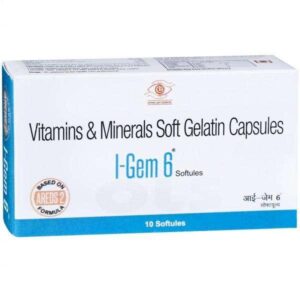VITAMIN + MINERAL
Vitamin: Vitamin is not a specific drug, but rather a group of organic compounds that are essential for the proper functioning of our bodies. They play a crucial role in various physiological processes, including cellular metabolism, immune function, and growth.
There are 13 essential vitamins classified into two categories: water-soluble vitamins (vitamin C and the eight B vitamins) and fat-soluble vitamins (vitamins A, D, E, and K). They are naturally present in many foods, and deficiencies can lead to various health issues.
The use of vitamins as drugs typically involves the treatment of vitamin deficiencies. They may also be used to enhance overall health and well-being or to support specific conditions. However, it’s important to note that taking excessive amounts of vitamins beyond the recommended daily allowance (RDA) can have adverse effects.
The mechanism of action of vitamins varies depending on the specific vitamin and its role in the body. For instance, vitamin C acts as an antioxidant, protecting cells from damage caused by free radicals. Meanwhile, vitamin D regulates calcium and phosphorus metabolism, promoting bone health.
The doses of vitamins vary depending on the specific vitamin and the individual’s age, sex, and health status. The recommended daily allowance (RDA) is the typical amount considered sufficient to meet the nutritional needs of the majority of healthy individuals.
While vitamins are generally safe when taken as directed, there can be side effects associated with excessive intake. Fat-soluble vitamins, which are stored in the body, can build up to toxic levels if consumed in excess. Water-soluble vitamins, on the other hand, are generally not stored in the body to the same extent and are eliminated through urine. However, megadoses of certain water-soluble vitamins can still cause adverse effects.
Side effects of excessive vitamin intake can vary depending on the specific vitamin but may include nausea, vomiting, diarrhea, abdominal cramps, headaches, dizziness, and in rare cases, organ damage. It’s important to consult with a healthcare professional or nutritionist before taking vitamin supplements to ensure proper dosage and prevent any potential interactions with other medications.
Mineral: I’m sorry, but “Mineral” is a very general term and cannot be identified as a specific drug. To provide accurate information, please provide the specific name or purpose of the drug you are asking about.

